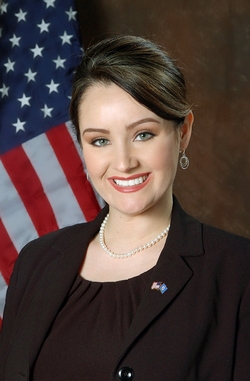
Doctors could be jailed for providing transgender youth with identity-related medical treatments under a new bill in the Kentucky legislature, the latest in a series of conservative legislative efforts in several states aimed at transgender minors.
The bill, sponsored by state Rep. Savannah Maddox, would make it a felony for medical providers to prescribe medications, including puberty-blocking or hormone treatments, or conduct surgeries, for anyone younger than 18 with the intent to alter their gender.
Ostensibly aimed at barring children who could still be grappling with their gender identity from undergoing body-changing treatments, the measure drew a sharp rebuke from LGBTQ advocates and families who say it would only heighten risks for transgender youth.
“These sorts of decisions need to be made by medical providers, not politicians,” said Chris Hartman, director of the Fairness Campaign, an LGBTQ-rights organization in Louisville. He said it represents a “coordinated political attack” on transgender people “for election-year purposes.”
Maddox did not respond to messages seeking comment. But last fall she wrote on her Facebook page her intention to draft the bill, saying, “I am a strong advocate for parent’s (sic) rights — but it is not the right of a parent to permanently alter a child’s gender or identity, even when based upon certain behaviors or the perceptions of a child’s mind which has not yet had time to fully develop.”
It’s rare for transgender minors to get surgery, and most have undergone years of consultations with doctors, counselors and family, often first changing names or how they dress, before any medications are adopted, experts said.
The U.S. Centers for Disease Control and Prevention last week issued a study that found access to puberty blockers helped reduced risks of mental health problems and suicide attempts, which some studies say are as high 40% among transgender youth.
“It’s a horrible thing,” Cassie Kasey said of the bill. Kasey said puberty blockers were important during a critical juncture for her transgender daughter, Maddie Dalton, who is now 20.
Dalton was among the first students at Louisville’s Atherton High School to come out as transgender, and her subsequent push for a policy allowing her to use the women’s restroom and locker room sparked a fiery public controversy in 2014 that made national headlines.
The measure joins several other proposed bills targeting transgender individuals in Kentucky’s General Assembly this year.
That includes a resurrected “bathroom bill” that would ban transgender students from using public restrooms that align with their gender identities.
Another bill targets transgender individuals in sports, forcing student-athletes to compete in school sports based on the sex listed on their birth certificate.
Bills restricting access to hormone treatment and surgeries for young transgender people have been introduced in several states, including South Dakota, said Mara Keisling, executive director of the National Center for Transgender Equality.
Such measures run counter to standards and guidelines endorsed by the American Academy of Pediatrics and the American Medical Association, the group said.
The Kentucky Medical Association did not immediately provide a response to the legislation. Some transgender residents said it would make getting knowledgeable transgender medical care extremely difficult for families.
The American Academy of Pediatrics recommends giving youths access to “comprehensive gender-affirming and developmentally appropriate health care” while laying out risks and benefits.
Janet Vessels, a Kentucky clinical counselor who works with transgender youth in collaborations with doctors, said providers follow established medical guidance and families carefully weigh risks and benefits at every step.
“They don’t do it haphazardly,” she said.
“There are a lot of things about trans kids that a lot of people don’t understand,” said Jeri Stine Hahn, who raised a Lexington transgender stepdaughter and who runs a support group for parents.
Her stepdaughter, Crystal Hahn, 20, said she socially transitioned at age 10, began hormone blockers at age 11 and began estrogen treatment at age 15. If the proposed bill were law, she said, the struggles would have been monumental.
“I genuinely don’t know if I’d even be alive,” she said.
Hahn believes the bills were fueled in part after conservatives seized on a case in Texas last year, when two parents clashed in a highly publicized custody battle that included a clash over their 7-year-old and gender identity.
According to media reports, the father alleged that the mother, a doctor, had pushed their child into self-identifying as a girl and advocated for related medical care, a charge the mother flatly denied.
Nonetheless, the father drew support from conservative politicians. Donald Trump Jr. last fall tweeted, “This is child abuse. People need to start to stand up against this bullshit.”
The New York Times reported that the South Dakota bill received input from groups including the conservative Alliance Defending Freedom. The Arizona-based group didn’t comment on whether it had consulted on Kentucky’s law but issued a statement.
“Our laws should protect every child’s opportunity to have a natural childhood. While approaches may differ, we should all agree that there is nothing natural or healthy about pumping kids full of puberty blockers and cross-sex hormones,” said Matt Sharp, the alliance’s senior counsel and director of state government relations. “Children should not be pushed to receive experimental treatments that can leave them permanently sterile and physically marred for life.”
The proposed bill in Kentucky also would create protections for public employees who express opinions about gender identity.
And it says parents can withhold consent for “any activity designed and intended to form their child’s conceptions of sex or to treat gender dysphoria,” the mismatch between gender identity and a person’s sex at birth.
The state, under the bill, cannot infringe on that decision. Its intent may be to give objecting parents a legal foothold, Keisling said.
The measure exempts children with a medically verifiable genetic disorder of sexual development, the bill says.
*story by the Courier – Journal